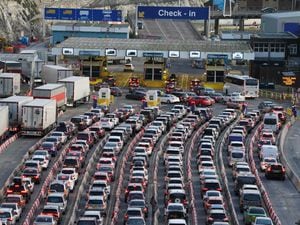Tourists could face 14-hour queues to enter Europe under new scheme, MPs told
The European Scrutiny Committee heard the Port of Dover and surrounding area could be hit by major disruption when the EU Entry-Exit System launches.

Tourists heading to Europe could face waits of 14 hours or more at border controls under a new scheme, MPs have been told.
The Port of Dover and the surrounding area could be hit by major disruption when the EU Entry-Exit System launches unless measures are introduced to prevent delays, Parliament’s European Scrutiny Committee heard.
Ashford Borough Council told the committee that 14-hour queues are a “reasonable worst case” scenario if the scheme is implemented as planned in October.
The new controls will mean people entering the EU will have to register their fingerprints and a photograph alongside their passport.
The Port of Dover and surrounding roads have seen multiple episodes of gridlocked traffic over the past few years, with post-Brexit checks adding to waiting times.
Tourist organisation Visit Kent voiced concerns that delays caused by the new system could have a knock-on effect on local businesses, which has been the case during previous periods of disruption.
Ashford Council warned that 14-hour delays at the port will likely see queues along the A20 and M20, which could block access to staff and tourist traffic at Eurotunnel in Folkestone.
Eurostar said that without upgrades, terminals could see queues of more than an hour at peak times.
High Speed 1, which runs UK high-speed rail services, said that the decision not to enable online pre-registration would “put enormous pressure on infrastructure at St Pancras International”.
Downing Street sought to downplay the risks of delays.
A No 10 spokeswoman said: “On some of those scenarios, rightly we’re not going to get into hypotheticals about delays…. but there are tried and tested contingency plans in place and a lot of work is managed by the Kent resilience forum so we will make sure we’re prepared and our focus remains on ensuring the scheme does not unnecessarily impact local communities or resort in delays for travellers.
“We are working very closely as you would expect with the French, with all the port authorities to ensure that travellers and passengers do not experience unnecessarily delays, that work continues.”
Chairman of the European Scrutiny Committee, Sir Bill Cash, said: “Queues of more than 14 hours, vehicles backed up along major roads, businesses starved of footfall: this evidence paints an alarming picture of the possible risks surrounding the Entry-Exit System’s implementation.
“Clearly, this policy could have a very serious impact, not only for tourists and travel operators but also for local businesses. I implore decision makers on both sides of the Channel to take note of this evidence.
“The scheme is due to be implemented in October this year; the clock is ticking, and these issues must be urgently addressed.”





